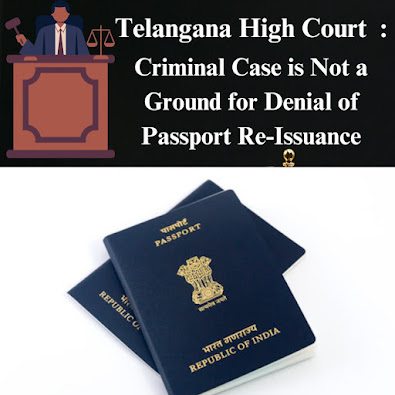Background of the Case:
The case revolves around the petitioner, Nikhath Afshan Qudsia, a homemaker from Hyderabad, who approached the High Court of Telangana for re-issuance of her passport. The petitioner’s original passport, issued in 2018, was valid until 2028. However, she sought to reissue her passport due to a change in her personal particulars.
Upon applying for a new passport on September 20, 2022, the petitioner received a communication from the Regional Passport Office, Hyderabad, dated November 21, 2022, stating that an adverse police verification report had been received. This report indicated that the petitioner was an accused in C.C. No. 1138 of 2021, pending before the VII Additional Chief Metropolitan Magistrate, Nampally, Hyderabad, involving offenses under Sections 342, 323, and 506 read with Section 34 of the Indian Penal Code (IPC). The petitioner was accused of not disclosing this information during her application process.
Petitioner's Argument:
The petitioner, represented by Advocate Syed Ashfaq Ahmed, contended that the said criminal case was a counterblast to another criminal case initiated by her against one Mr. Abdul Feroz Khan (C.C. No. 1140 of 2022). She claimed that she had informed the authorities about the pending criminal case while applying for the passport through an online service, ‘Rose Online Services,’ and denied any suppression of facts. The petitioner argued that the refusal to consider her explanation dated November 24, 2022, and legal notice dated December 15, 2022, by the Regional Passport Officer, was arbitrary and violated Articles 14 and 21 of the Indian Constitution.
Respondent's Argument:
The respondents, represented by Central Government Counsel Mr. P. Devender, argued that since the petitioner was an accused in a criminal case, the passport could not be reissued due to the adverse police verification report.
Court’s Observation:
Justice K. Lakshman observed that merely being an accused in a pending criminal case is not a sufficient ground for refusing to reissue a passport. The court referred to the Supreme Court's judgment in the case of Vangala Kasturi Rangacharyulu v. Central Bureau of Investigation (2020 Crl.L.J. (SC) 572), which held that a passport authority cannot refuse to renew a passport solely based on the pendency of a criminal appeal or trial, unless the applicant has been convicted in the last five years for an offense involving moral turpitude and sentenced to imprisonment for not less than two years.
Also Read:co-owner cannot sell property
Court’s Decision:
The High Court, while disposing of the writ petition, directed the Regional Passport Officer to consider the petitioner's application for the re-issuance of her passport on the following conditions:
- The petitioner must submit an undertaking and affidavit before the VII Additional Chief Metropolitan Magistrate, Nampally, Hyderabad, in C.C. No. 1138 of 2021, stating that she will not leave India without the court’s permission and will cooperate in concluding the trial.
- The trial court must issue a certified copy of the undertaking within two weeks of its submission.
- The petitioner must then submit the certified copy of the court's order and the undertaking before the Passport Officer.
- The Passport Officer must consider the application and the court's observations and reissue the passport in accordance with the law within three weeks of receiving the documents.
- Upon re-issuance, the petitioner must deposit the original passport with the trial court.
- The petitioner is granted the liberty to apply for permission to travel abroad, which the trial court will consider based on the law.
The writ petition was disposed of without any order as to costs.
Conclusion:
This judgment reaffirms the principle that merely being an accused in a pending criminal case is not an absolute ground for denying a passport renewal. The court's directive balances the petitioner's right to travel with the necessity of ensuring her cooperation in the ongoing trial, thereby upholding the principles of natural justice.

